The Bus Uncle Interview in Next Magazine
So far, the world has heard from the young man and the cameraman in the famous Bus Uncle episode. But who cares about them? The world wants to know about the Bus Uncle himself.
How do you find him? This is where the resources of the mainstream media rule! The 68X bus goes to Yuen Long where Bus Uncle got off. So Next Magazine apparently sent out its reporters to canvass Yuen Long and the surrounding area. Eventually they found Bus Uncle, who was not quite aware of his global fame (he was not reading newspapers, he does not listen to radio, his television set is broken, and he did not come across the story while accessing the Internet at the public library).
So here is the Bus Uncle interview as reported by Next Magazine (Issue #847, June 1, 2006) (see scanned images at Ming Alive). Portions of the interview can seen in video form at the Next Magazine website (subscription required) or at YouTube:
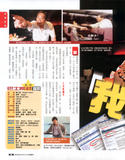
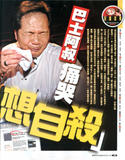
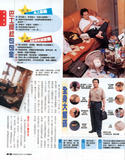
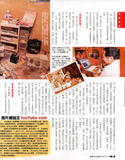
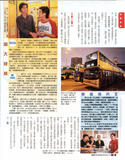
[in translation]
The internationally famous Bus Uncle video appeared on the Internet early in May, but the main character Bus Uncle has been invisible.
Our reporters (note: the article is credited to three reporters) have been "searching" in various places. In a remote village in the Yuen Long district, a villager offered a clue: "There is an 'uncle' in this village who looks like him. He is a weird dude. He likes to talk aloud all day and shake people's hands."
The reporter obtained the address of the 'uncle' and went there. At the place, the paint had peeled off the iron gate and there was dust everywhere. The door bell was not working. So the reporter banged on the door loudly. A voice just like that of Bus Uncle yelled loudly: "Who is it?"
The door opened, and a middle-aged man with gold-rimmed glasses appeared.
"What?" he said.
"Do you know that you are 'red hot' now?" asked the reporter.
He was astonished: "Red hot? I don't know about that? Are you talking about the Bus Uncle thing?"
The reporter said: "Yes! I heard that it was you!"
The middle-aged man laughed bashfully: "Yes! I only got a free copy of Headline Daily today and saw myself in there. I found out then that I had become Bus Uncle!" Bus Uncle's real name is Chan Yuet-tung (Roger Chan).
51-year-old Roger Chan has one small batch of hair that has grown especially long. From the back, it looks like an octopus. Eyewitnesses on the bus had said that Bus Uncle had a pigtail behind his back. Right at that instant, his first-generation 3G mobile phone started to ring, and the ring tone was the same in the video clip: the Twins' old song "Lose face."
When the reporter entered the house, the view of the 200+ square foot living room was piled with junk and in a total mess. There was an out-of-use computer lying on the floor. In the corner was a five-feet tall altar covered with joss-stick ashes. The kitchen has become the home of five cats, and it was just as messy there in addition to the stench of cat urine.
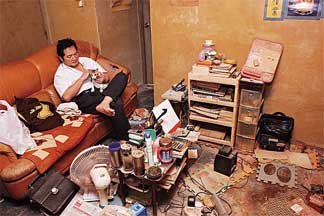
Chan said that he has been unemployed for more than ten years. He lives off his $1,800 in welfare payments. He lives by himself and his cats keep him company. He has no friends. He rarely contacts his family. His only entertainment is to take the 68X bus from Yuen Long to Mong Kok to visit his girlfriend whom he calls "Honey" and has known for one month.
"Are many people talking about this? I have not been reading the newspapers the past few days. The television set is not working. When I went to use the Internet at the library, I did not see this item."
Chan had not yet seen the Internet video clip in which he was the principal character. So the reporter used the notebook computer to show the video right there and then. When Chan saw himself on the screen, he could not help but giggle. When the video clip came to his "classical" sayings -- "I've got pressure and you've got pressure, so why are you challenging me?" and "Not solved! Not solved! Not solved!" plus the whole stream of foul-mouthed cursing, he roared out in laughter. When the reporter asked him what happened, he put aside his smile and then showed the true colors of Bus Uncle: "Because he deliberately tried to challenge me!"
On the night of April 27, before he got on the bus, Chan had a quarrel with his girlfriend. After he got out of his girlfriend's apartment, he walked down alone to the bus stop on Nathan Road in Mong Kok as usual to take the 68X bus home. At the time, he was especially emotionally down.
After he got on the bus, Chan felt that nobody cared about him and he was also afraid that his girlfriend would leave him. So the idea of suicide came to him. Therefore, he called the Samaritans' hotline in Hong Kong to talk to a social worker. But the bespectacled Elvis behind him tapped him on his shoulder three times to tell him to lower his voice.
"I was depressed that night. I was worried that my girlfriend would leave me. I wanted to kill myself. Whenever I am unhappy, I would call the Samaritans to talk to them in order to reduce the stress. But while I was talking, the passenger behind me tapped my shoulder to tell me not to talk! At that time, I wasn't speaking loudly. I was talking about my private matters. Why would I be talking loudly? How come when other people in the rear talked on the phone, he did not object but he only selectively picked me out? He was deliberately challenging me!
"So I told him: You've got pressure, I've got pressure so are you picking on me because I am older? I said, You better apologize to me. Since we both have pressures, why don't we get off the bus and slug it out? He said no and so I said that he should shake my hand and apologize!" Although the incident took place one month ago, Chan was still angry about it.
But soon after the bespectacled youth shook hands with Chan in apology, he started to provoke Chan again. He said: "If I don't tap you on the shoulder, then should I tap you on the top of your head instead!" Chan could not hold himself back again and so continued his tirade.
"You prevent me from speaking on the phone to reduce my stress. So I am going to curse you out for sure. So I kept cursing him, because I have unresolved problems inside myself and I don't feel good! This is like me trying to use the restroom but you stop me by holding me back physically! So I am not cursing you because I want to curse you. If you won't let me relieve my stress, I am going to take it out on you. That is only fair!"
After releasing his anger, Chan sat down. At that moment, the phone rang again. The Samaritan social worker was concerned about him suddenly cutting off their previous conversation and called him back in case he was going to do something foolish. Chan then continued to talk on the phone until he got off the bus in Yuen Long.
As for people condemning Bus Uncle for using foul language to curse people on the bus, Chan yelled: "I did nothing wrong!" Then he propounded on his theory of "foul language": Foul language is like hors d'oeuvres. If you utter three foul-mouthed phrases, you will need to throw one punch less because you have released your anger already. If you don't use foul language, you may have to bring out a knife already."
But in front of the reporter, Chan was not raging. His gentle tone was completely different from the raging man in the video clip. He said that he only uses foul language when provoked. But his neighbors were less than complimentary about him: "He talks so loud on the telephone. People upstairs and downstairs can hear him. He also likes to talk loud on the mini-bus! He used to own a car. When he washed the car, he just stood at the window of his apartment and directed the water downstairs. One time, a neighbor was doing interior decoration and he complained about the noise with a lot of foul language. Then he wanted to 'shake hands' with people. He said that he had trained in martial arts before and when he squeezes someone's hand, he can crush the bones."
When the reporter asked Chan if he likes to "shake hands," he said: "Handshaking is good. It means peace!" When asked if he would come to shake hands with the bespectacled youth, he said: "I don't mind. We are brothers across the four seas. In this world, nobody is your enemy or your friend forever!" Then he even proposed to have a website named www.busuncle.com along with the bespectacled guy and the cameraman Jon so that they can sell the video clips on the Internet and get him off the welfare roll.
The neighbors also say that Chan often claims that he is under stress. During the interview, Chan mentioned that he is under "a great deal of stress" many times. When the reporter asked him about those pressures, this strong, grown man began to cry: "Because I am lonely and I am afraid of losing my girlfriend!"
Chan values love: "Love is the most important thing. I am very lonely. When I am by myself, I get very pessimistic. I want to kill myself!"
He said that he has been divorced before and that is why he values his current girlfriend Shirley because she appreciates his fruit plate. Preparing the fruit plate is the main way for Chan to relieve stress. "Sometimes when she gets mad, I would carve on the fruit plate 'I love Shirley' and she isn't mad anymore. She is the first woman to appreciate my fruit plate."
But Shirley has different ideas: "Yes, he does them well. But sometimes I feel that simplicity is enough.!" Chan does not dare to tell his girlfriend that he is Bus Uncle because she may be displeased. Since his girlfriend does not like his pony tail, he intends to cut it off a few days later. He said: "For the sake of a tall building, I am willing to sacrifice a backyard."
For the sake of Shirley, Chan writes her a love letter each day. In the afternoon, he goes to her apartment to carve a fruit plate and make dinner for her and her nine-year-old son. His best dishes are Yugoslavian and Hungarian dishes. But he does not dare go every day because the girlfriend does not know that he is unemployed. He has to pretend to go to work and maintain a man's honor. Chan is very particular about how people look at him. He feels that society does not accept him. His relationship with his own family is distant.
Chan explained this background. He has one older brother and six younger sisters. His father has passed away, and he speaks to his mother occasionally. He had been married twice, both times ending in divorce. He has a 25-year-old daughter who was raised by her grandmother. He has not seen her for almost twenty years. "I thought that I treated her badly. I did not fulfill the responsibility of a father. But I think about her all the time. I remember that when she was small, I took her to feed the dogs often. Those were the happy days. But she does not want to see me now, so what can I do?"
He said that his father had a Chinese medicine pharmacy in Kowloon City once upon a time, and they can be said to be well-off. But he had encephalitis when he was born and did not recover until he was six years old. He was always getting into fights at school. He kept getting reprimanded. He had to switch elementary school thrice. "One time, some students surrounded me and treated me like a clown. They asked me why I wouldn't speak up. So I picked up a wooden chair and fought back. I hit a fellow student on the head. I ended up at the police station, but I was let go!"
Chan said that he had studied in Sydney, Australia. He had done more than 20 million dollars in the lottery, but because he was obsessed with gambling, he became broke in nine months. "At 16, I bought a car, a villa and a take-away store. Every day, I went to the casinos, night clubs and discos. In the end, I lost all the money. The casino took my car and villa. So I had to return to Hong Kong."
Thereafter he roamed around the world. When he was studying in Munich (Germany), he killed someone while driving a car and left the scene. For this, he was arrested by the police and sentenced to eight years. He filed a successful appeal and was released after serving nine months in jail. Later, in England, he got into an argument with someone else over a woman. While jostling, the other party fell down the stairs and died. He was charged with manslaughter. "Luckily, the close-circuit television showed that he fell down the stairs on his own accord. So I beat the charge but I was sent back to Hong Kong."
When he got back to Hong Kong, his parents would not take him in because they were so disappointed in him. He slept in the Statue Square in Central. Later on, he worked at a jewelry store in To Kwa Wan. Every night, he went on the casino ship to gamble. After half a month, he had lost more than a million dollars. He ended up owing several million dollars and was forced to smuggle heroin to Belgium. That was in 1990.
"I brought a large LV bag filled with white powder. I was arrested as soon as I got there. I was sentenced to eight years in prison in Brugge (note: there is such a prison in Belgium). Inside the prison, I faced the four blank walls every day and I can only hear the sound of the footsteps of the prison guards going back and forth. It was a lonesome feeling. Nobody visited me. I was thinking about my daughter and how she used to walk around me when she was young. Every night, I had to sing Tom Jones' Green Green Grass of Home to relieve my sadness."
Chan described his prison in detail to the reporter. He provided the name of the prison accurately to the reporter. And Tom Jones' song is obviously about homesickness.
After four years in jail, Chan claimed to have completed academic degrees for law, nutrition and philosophy. He claimed to have participated in the invention of the Ortis fruit diet cube that is still available in Hong Kong. He also taught himself how to do fruit sculpture in prison. He claimed to have been appreciated by the Belgium king Baudouin (editor: such a person did exist) and was picked up each week by special car to carve the fruit plate at the royal palace. He also said the king died one year after he ate from the fruit plate. Later on, he was released in 1994 in an amnesty in appreciation of his contributions towards translating the Belgium government tourist guidebook into Chinese!
When Chan returned to Hong Kong, he could not find work. He said that the employers were biased against him on account of his prison record so that he had "nowhere to go." He has been unemployed since. "I am despondent. I don't feel that society accepts me. I have obtained many academic degrees. I can reform society, I can help society but people have labeled me as a low-life!" Chan cried in tears.
But this does not mean that he has not made a name for himself already. In 1997, 2002 and 2005, Chan entered the election for the Chief Executive of Hong Kong. The newspapers have published reports on his appearance at the senior citizens' forum. His platform included: establishing a bureau to control triad societies; establishing a red-light district; promoting the adoption of senior citizens; establishing a prison boat and so on. He figured prominently, or at least he created a deep impression among his neighbors. When the reporters interviewed his neighbors, they either said that he talked loudly or that he ran for the Chief Executive post.
Although he has been defeated each time, Chan did not mind. He said that he will run again next year: "If I lose, I will try again. I have the determination."
In the face of pressure, Chan's method of stress relief is to sing karaoke (apart from carving fruit plates). Usually he goes to Shenzhen where it is cheaper. The reporter took him to the Red Box club in Mong Kok to relieve stress together. When he got there, he would not let go of the microphone. He kept looking for songs and he sang louder and louder as if he wanted to release all the sad feelings inside. Guangliang's "Fairy tale" and Wang Qimin's "Mouse Loves Corn" are his current favorites.
Then he picked Green Green Grass of Home that he sang so often in prison. At that point, he burst out in tears: "When I was in jail, I was not free physically but my heart was free and I can learn what I want to learn! But now I am physically free but my heart is not. Nobody wants to give me a chance. Do you understand the conflict?"
Chan spoke to the reporter for one full day. He seemed to remember everything about his life in all the details. When he mentioned his studies, he said that he was at New Method College and he got into fight with the current KMT chairman Ma Ying-jeou who was studying at the neighboring Tatung Middle School. He said that Ma Ying-jeou even sent him a goodluck note for his Chief Executive campaign. This aroused a great deal of suspicion with the reporter, because Ma left Hong Kong to live in Taiwan when he was one year old. How much of this is real? And how much is false?
But the reporter feels that Chan is actually quite vulnerable. He yearns most of all for recognition and care from others. When asked if he has friends, he says: "Not many. Friends are all fakes. It is all over after you use each other! I don't want people to know too much about me. If they know too much, they will look down on me."